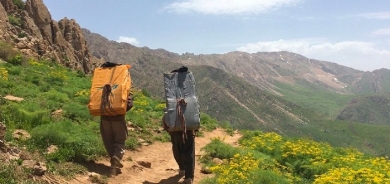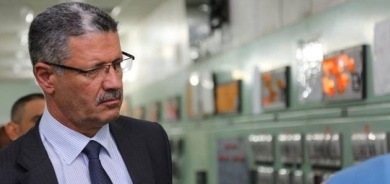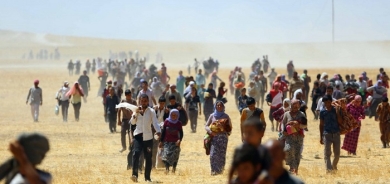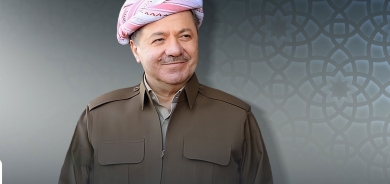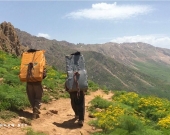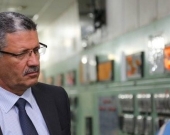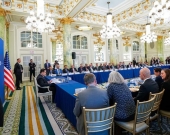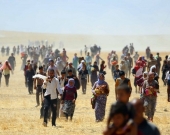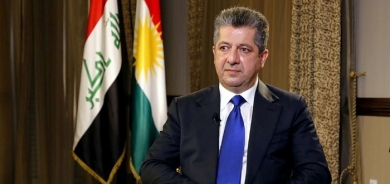US, UK, Australia warn citizens to avoid Kabul airport, citing risk of terror attack
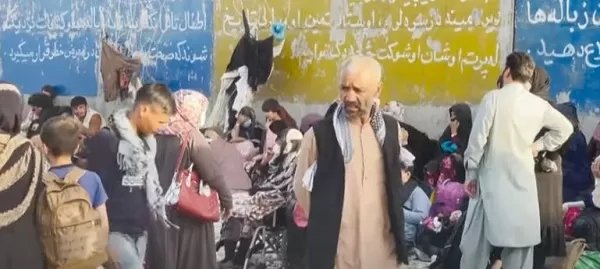
The US, the UK and Australia are warning their citizens in Afghanistan against traveling to Kabul airport, with the British armed forces minister saying Thursday there is “very credible” intelligence that militants are planning an "imminent" attack on those gathering at the airport.
The United States, Australia and Britain have told their citizens to leave the area immediately. It comes after US President Joe Biden warned of the threat of attacks from militants linked to the Islamic State group.
“There is now very, very credible reporting of an imminent attack," British armed forces minister James Heappey told BBC radio on Thursday, adding that those seeking to leave "should not come to Kabul airport; they should move to a safe place and await further instructions”.
“I can only say that the threat is severe," he continued. "We will do our best to protect those who are there. There is every chance that as further reporting comes in, we may be able to change the advice and process people anew, but there is no guarantee of that.”
Afghanistan evacuations in final phase amid mounting terror warnings
A NATO country diplomat earlier told Reuters that Taliban cadres have promised to provide security outside Kabul airport, but intelligence reports of an imminent threat from Islamic State militants cannot be ignored.
"Western forces, under no circumstances, want to be in a position to launch an offensive or a defensive attack against anyone in Afghanistan," added the diplomat, who was speaking on condition of anonymity.
The warnings come as Afghans on Thursday hurried to escape Taliban rule. Western officials said the group had made assurances that some evacuations would be permitted after next week's US withdrawal deadline.
More than 80,000 people have been evacuated since August 14, but huge crowds, hoping to flee the threat of reprisals and repression in Taliban-led Afghanistan, remain outside Kabul airport.
Western nations warn of terror threat at Kabul airport
Washington and its allies have been flying out thousands of Afghans every day on hulking military transports, but it has become an increasingly difficult and desperate task.
The Taliban have also been accused of blocking or slowing access for many trying to reach the airport, although they have denied that charge.
US, UK, Australia issue warnings
In an alert issued on Wednesday evening, the US embassy in Kabul advised American citizens to avoid travelling to the airport and said those already at the gates should leave immediately, citing unspecified "security threats".
Australia also urged its citizens and those with a visa for Australia to leave the area. "There is an ongoing and very high threat of a terrorist attack," Australia's Minister for Foreign Affairs Marise Payne told reporters in Canberra.
The warnings came against a chaotic backdrop in the capital, Kabul, and its airport, where a massive airlift of foreign nationals and their families as well as some Afghans has been under way since the Taliban captured the city on August 15.
While Western troops inside the airport worked feverishly to keep the evacuation moving as fast as possible, Taliban fighters guarded the perimeter outside where thousands of people have thronged, trying to flee the country rather than stay in a Taliban-ruled Afghanistan.
"It's very easy for a suicide bomber to attack the corridors filled with people and warnings have been issued repeatedly," Ahmedullah Rafiqzai, an Afghan official working at the Directorate of Civil Aviation at the Kabul airport, told Reuters.
"But people don't want to move, it's their determination to leave this country that they are not scared to even die, everyone is risking their life."
Taliban will allow some departures after deadline, says Blinken
US Secretary of State Antony Blinken said earlier on Wednesday that the Taliban had made commitments to allow departure of Americans, "at-risk" Afghans and people from other nations even following Tuesday's cutoff.
"They have a responsibility to hold to that commitment and provide safe passage for anyone who wishes to leave the country," Blinken told reporters.
Blinken spoke hours after Germany's envoy to Kabul said a Taliban negotiator had assured him Afghans bearing the right documents could leave even after the deadline.
Up to 1500 Americans still in Afghanistan
Blinken told reporters that at least 4,500 American citizens of the 6,000 Americans who wanted to leave Afghanistan have departed, leaving up to 1,500 American citizens who may still need to be evacuated.
He said officials have been in "direct contact" with another 500 Americans who want to leave and have provided them with "specific instructions on how to get to the airport safely".
Officials were "aggressively reaching out" to the remaining 1,000 Americans to "determine whether they still want to leave", he said.
"Of the approximately 1,000, we believe the number of Americans actively seeking assistance to leave Afghanistan is significantly lower," Blinken said.
"Some may no longer be in the country. Some may have claimed to be Americans but turn out not to be. Some may choose to stay."
Turkey withdraws troops
Meanwhile, Turkey, which had more than 500 non-combat troops stationed in Afghanistan, said Wednesday it had started pulling out its forces.
Turkey troops were part of NATO's now-abandoned mission in the war-torn country.
Turkey had been negotiating with both the Taliban and Washington about playing a role in protecting the airport after the US troop withdrawal. But the Taliban's swift capture of the Afghan capital left those plans in disarray.
"It is important for Afghanistan to stabilise," Turkish President Recep Tayyip Erdogan said as the troop withdrawal was announced.
"Turkey will continue to be in close dialogue with all parties in Afghanistan in line with this goal."


